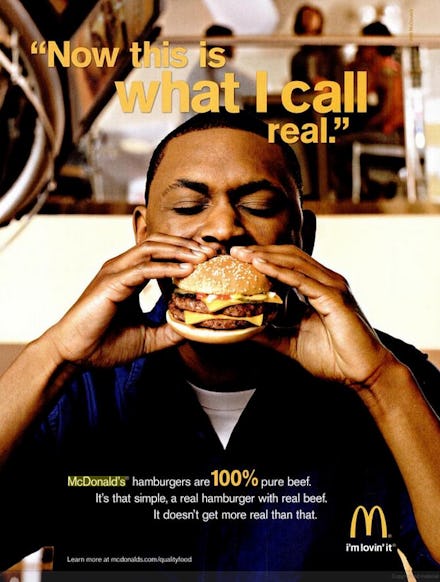These Images Highlight McDonald's Dangerous Relationship With Black America

Attention, black people – McDonald’s really wants you to eat their food.
Whether you’re “gettin’ down” on some Chicken McNuggets or “lovin’” the return of the McRib, it’s important to recognize not just the tastiness of their artery-clogging delights, but how “real” and “deeply rooted” in your community the company is. They even sponsor a basketball tournament!
For many, this is no secret. The fast food giant hasn’t camouflaged its aggressive targeting of minority consumers, whether through eye roll-inducing linguistic coding or strategic community initiatives. But until NPR’s Gene Demby curated this 40-year series of Mickey D’s ads, the pattern’s long-term persistence hadn’t fully been explored – not to mention its devastating consequences.
For our purposes, it kicked off in the 1970s, with particular emphasis on “gettin’ down” and “dinnertimin’”:
Image Credit: NPR Code Switch
Because how will black people know you’re trying to sell them things unless you drop the G’s at the end of verbs?
The early ‘80s saw greater focus on economic empowerment, with the insistence that blacks weren’t just valued customers, but integral cogs in the machine that kept the heart attack factory chugging along:
Image Credit: NPR Code Switch
This culminated in the early 1990s, with the famous – and famously parodied – “Calvin’s got a job” ads:
Here McDonald’s uses the story of Calvin to highlight the social mobility potential that comes with working there. His rise climaxes with a management position, and the suggestion that he’ll own the place one day if he just keeps on keepin’ on.
Finally, here's an ad from 2008:
Image Credit: NPR Code Switch
The company has since set its sights on more community-oriented efforts. Initiatives like the “confusing” and “upsetting” 365 Black site – designed to “honor” black history while also providing scholarships and volunteer opportunities – have made McDonald’s modus operandi increasingly transparent, while managing to piss off hordes of Twitter users in the process.
But why black people? According to Bloomberg Businessweek, it's relatively simple: "The ethnic consumer tends to set trends," says Neil Golden, McDonald’s U.S. chief marketing officer. "[They] help set the tone for how we enter the marketplace."
Brand guru Steve Stoute adds: "Most companies think they can box in Latinos, box in African-Americans, and then run the general market ad. McDonald's will take an ad that could be primarily geared toward African-Americans and put a general market advertising dollar behind it."
This emphasis on black consumers has clearly led to massive success, but at what cost? The situation is dripping with irony. For starters, it’s no secret that African-American women have the highest obesity rates in the country, and that black children are far more likely to be overweight or obese than their white counterparts:
Image Credit: Office of Minority Health
What isn’t common knowledge is that fast food restaurants like McDonald’s are far more often located in black neighborhoods, or near schools with higher numbers of black students. Black children are routinely “overexposed” to fast food ads, especially through after-school TV programming, and networks that cater to black audiences are disproportionately filled with fast food commercials.
All told, Mickey D’s efforts to highlight investment in the black community seem starkly in opposition to the rate at which they flood these same communities with extremely unhealthy food. This inevitably contributes to a slew of health issues, from heart disease in adults to “skyrocketing” diabetes rates in children. It’s unclear whether community initiatives like 365 Black are meant as a distraction from this, or merely to placate some overriding guilt complex. Either way, one thing is clear: McDonald’s has identified black people as an extremely powerful marketing ally.
And they won’t be giving that up anytime soon, no matter how devastating the results.